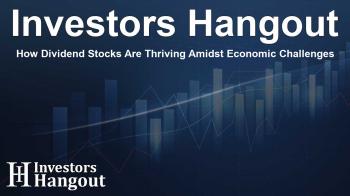How Dividend Stocks Are Thriving Amidst Economic Challenges

Analyzing Dividend Stock Appeal in Today's Market
In a climate marked by persistent geopolitical uncertainty, investors are redirecting their focus towards dividend-yielding stocks and funds. With global stock markets adapting, understanding which investments can thrive becomes crucial for those seeking returns amidst rising rates.
Recent Trends in Dividend Investing
After a period of lackluster demand, there is newfound enthusiasm for high dividend funds. The Federal Reserve's decision to maintain elevated interest rates has influenced this trend significantly. Investors are now looking at opportunities that yield higher returns compared to traditional bonds.
Significant Inflows in Dividend Funds
As noted by experts, the recent data from April has shown a remarkable resurgence, with equity income ETFs gaining approximately $4.9 billion in inflows. This surge indicates a clear pivot in investor sentiment towards dividend-yielding investments.
Key Players in the Dividend Space
Leading the charge in this dividend renaissance are funds like the Schwab US Dividend Equity ETF (SCHD) and the Vanguard Dividend Appreciation Index Fund ETF (VIG). These funds are becoming increasingly popular due to their solid performance and attractive yields.
The Shift in Investor Behavior
As economic conditions evolve, experts point out that high interest rates reduce the attractiveness of bonds, prompting investors to seek reliable dividend-paying stocks instead. This shift not only provides better yield opportunities but also aligns with conservative investment strategies.
Top Dividend Stocks to Watch
A notable mention from industry professionals includes investing in well-regarded companies such as Kroger Co. (KR), Chevron Corp. (CVX), and BP PLC (BP). Each of these companies offers impressive dividend yields that stand out in today's market: Kroger features around 9.4%, Chevron offers 4.78%, and BP provides an attractive 6.59% yield.
Comparing Yields to Treasury Bonds
Investors are particularly drawn to dividend yields that often exceed the yields of 10-year Treasury bonds currently pegged at about 4.37%. This trend underscores a strategic preference for dividend stocks, as they offer both current income and the potential for growth.
Economic Conditions Favoring Dividends
As experts continue to monitor economic factors such as geopolitical tensions and market volatility, dividend stocks are positioned as a safer investment option. Their stability serves as a hedge against uncertainty, offering investors peace of mind during unpredictable times.
Future Outlook for Dividend Stocks
The positive momentum for dividend stocks is expected to continue, particularly as the Fed's policies maintain a high interest rate environment. This scenario bodes well for dividends, making them a sought-after investment choice among income-focused investors.
Strategic Considerations
Investors are encouraged to develop diversified portfolios that emphasize high-quality dividend stocks, utilizing ETFs like SCHD and VIG for easy access to these lucrative opportunities. Such diversification can help mitigate risks while tapping into the current market trends.
Awareness of Risks
While the outlook remains positive, it's essential for investors to remain vigilant about risks such as potential dividend cuts or broader economic slowdowns. Staying informed will be key to navigating these uncertainties and ensuring growth in their investment strategies.
Evaluating Stock Performance
An analysis of the recent performance shows that the mentioned ETFs and stocks are demonstrating resilience:
Performance Overview
• Schwab US Dividend Equity ETF (SCHD): 2.47% over the last month, 7.10% year-to-date, and 10.78% in one year. • Vanguard Dividend Appreciation Index Fund ETF (VIG): 2.18% over the last month, 7.31% year-to-date, and 11.03% in one year.
Staying up-to-date with such market movements will assist investors in making informed decisions.
Frequently Asked Questions
What are dividend-yielding stocks?
Dividend-yielding stocks are shares that pay a portion of the company's earnings to investors in the form of dividends, providing a steady income stream.
Why are dividend stocks popular during high interest rates?
They become more attractive when bonds yield lower returns, making dividends a more appealing option for income-seeking investors.
Which companies currently offer high dividend yields?
Companies like Kroger, Chevron, and BP offer competitive dividends, appealing to investors looking for reliable income.
How can I invest in dividend stocks?
Investors can purchase shares directly or opt for ETFs that focus on dividend-paying stocks to gain broader exposure.
What are the risks associated with dividend stocks?
Risks include potential dividend cuts during economic downturns and the overall performance of the stock market that may affect prices.
About The Author
Contact Dominic Sanders privately here. Or send an email with ATTN: Dominic Sanders as the subject to contact@investorshangout.com.
About Investors Hangout
Investors Hangout is a leading online stock forum for financial discussion and learning, offering a wide range of free tools and resources. It draws in traders of all levels, who exchange market knowledge, investigate trading tactics, and keep an eye on industry developments in real time. Featuring financial articles, stock message boards, quotes, charts, company profiles, and live news updates. Through cooperative learning and a wealth of informational resources, it helps users from novices creating their first portfolios to experts honing their techniques. Join Investors Hangout today: https://investorshangout.com/
The content of this article is based on factual, publicly available information and does not represent legal, financial, or investment advice. Investors Hangout does not offer financial advice, and the author is not a licensed financial advisor. Consult a qualified advisor before making any financial or investment decisions based on this article. This article should not be considered advice to purchase, sell, or hold any securities or other investments. If any of the material provided here is inaccurate, please contact us for corrections.

